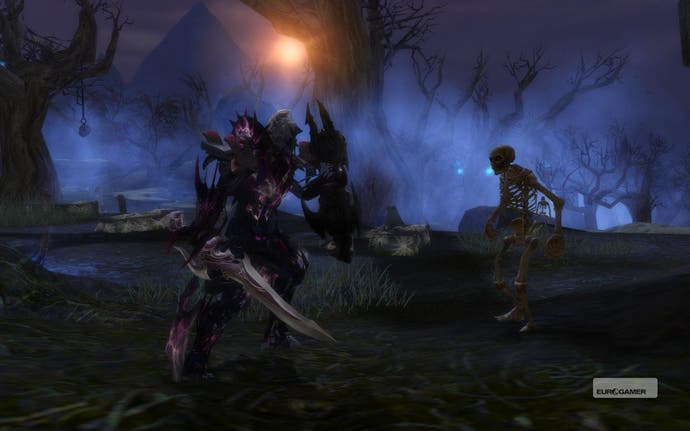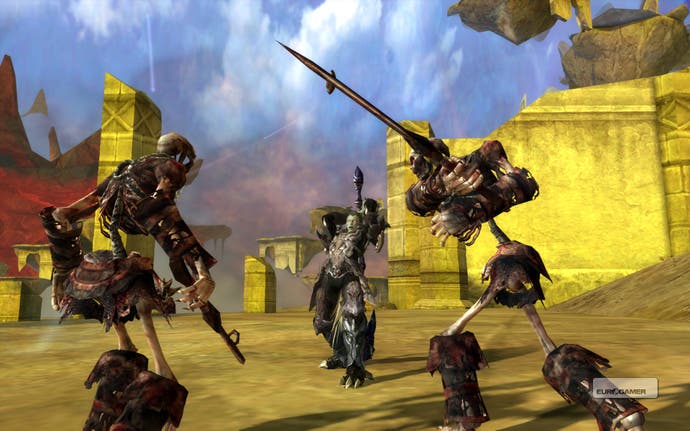Aion: The Tower of Eternity
From here to eternity?
On that subject - gold-sinks are everywhere in this game. Everything in Aion costs you money, and quite a lot of it. It's a shock to the system at first, but it's actually a very balanced economy, going by the thriving player trade in the beta. Feeding into this, crafting is detailed and enjoyable, with some great rewards. It's not mandatory, however, since there are plenty of ready sources of good loot in the game; quest rewards are plentiful, regular enemies drop some nice pieces and the armour sets are stunningly detailed and covetable. You won't have any trouble figuring out what boosts are for you, either, thanks to Aion's self-explanatory stat system.
Beyond the somewhat shallow, prescriptive combat, it's hard to pick holes in Aion. Community, economy, persistence, customisation, long-term advancement - all these peripheral areas, so often shaky in an MMO's early days, are carefully thought-out. Everything feels taut and considered, assembled from NCsoft's wealth of experience in online gaming as well as a careful study of what World of Warcraft did right (albeit what it did right five years ago - like most rivals, NCsoft is still some way from catching up with what Blizzard is doing right today).
But, pre-Abyss, it's very, very samey. And when you do get to level 25 - when Aion starts to show its true colours - there is no guarantee that you're going to like what you find.
Like Warhammer Online, Aion seems like an MMO for the everyman on the surface, but actually has a very specific agenda. This, embodied in the Abyss, is the concept of PvPvE (player-versus-player-versus-environment): the three-way clash between the two players races and the crazed, dragon-like Balaur. It's a mix of questing, skirmishing with other players, raiding and being raided by the Balaur, capturing "artifacts" (control points which convey buffs to your side), and waging large-scale, organised and (going by footage from Korean servers) spectacular siege warfare over the very valuable fortresses. All of this rewards you with Abyss Points, the key currency for the best endgame loot.

To get the most out of Aion, you're going to have to engage with the Abyss, get organised with other players, and enjoy both PvP and PvE. In this game, the two are almost inseparable. It seems to be a compelling system, and after a good run in Korea, it will probably be well-balanced. But it won't be to all tastes, it will depend on large player populations with strong leadership, and there are few alternatives to indulge in.
Instanced dungeons offering a more focused PvE challenge are quite rare before the very highest levels. Similarly, PvP is tightly controlled by level, and only available in open-world areas, with the city Coliseums offering the solitary opportunity for a jump-in, casual bout. Outside the Abyss - where raiding parties are able to use Rifts to travel to the opposing faction's side - it's hard to find a scrap when you want one, and hard to avoid one when you don't.

You'll either like the sound of this singular blend of MMO play-styles or you won't. If you do and are prepared to take the quality and sustainability of the high-level content on trust, for now - trust which, to be fair, the game seems to deserve - I'd recommend it. Aion's particular vision is built on a rock-solid if uninspired foundation, a meticulous mastery of the traditional MMORPG form. It might as well have been made by Toyota or Volkswagen. It won't let you down.
If you don't like the sound of the Abyss, however - if you're the sort of player who likes an online world to bend to your whim, rather than bend you to its own - then committing to Aion is a gamble, because there's not much else to be wrung from it but the grind. A streamlined, structured, gorgeous grind, an addictive and even rewarding grind if you're that way inclined, but a grind nonetheless. An ultimately grim and unvarying pursuit. A string of key-presses, in the same endlessly repeating sequence, reaching to the moon and back. 2, 2, 3, 3, 5, 2, 3, 4, 5...

